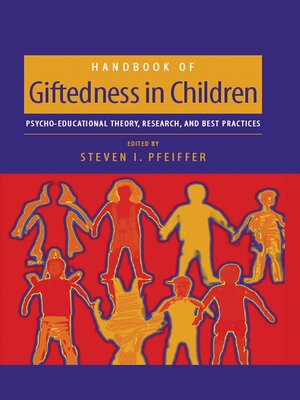Handbook of Giftedness in Children
ebook ∣ Psychoeducational Theory, Research, and Best Practices
By Steven I. Pfeiffer

Sign up to save your library
With an OverDrive account, you can save your favorite libraries for at-a-glance information about availability. Find out more about OverDrive accounts.
Find this title in Libby, the library reading app by OverDrive.



Search for a digital library with this title
Title found at these libraries:
| Library Name | Distance |
|---|---|
| Loading... |
Mention "special needs children", and most people think of students struggling to overcome learning and physical disabilities as well as problem behaviors that interfere with achieving full academic potential. But there is a hidden population of special needs children – the gifted and talented – and their teachers, parents, and other professionals are often not well equipped to respond to their unique academic and developmental needs.
In one comprehensive resource, the Handbook of Giftedness in Children brings together leading experts from the fields of psychology and education, combining theory and applied empirical research on such crucial topics as conceptualization, types of intelligence, developmental considerations, and ethical and legal concerns. Particular attention is given to social and family contexts, and evidence-based strategies and interventions offer solid guidelines on assessment, curriculum design, and encouraging and nurturing talent – from preschool through adolescence.
Sample topics include:
This volume is an essential resource for anyone working with gifted and talented children, including clinical child and school psychologists, educators and other allied professionals as well as child psychiatrists, family therapists, social workers, and pediatricians and other healthcare professionals. It also serves as an invaluable guide for graduate students in these and related fields.







